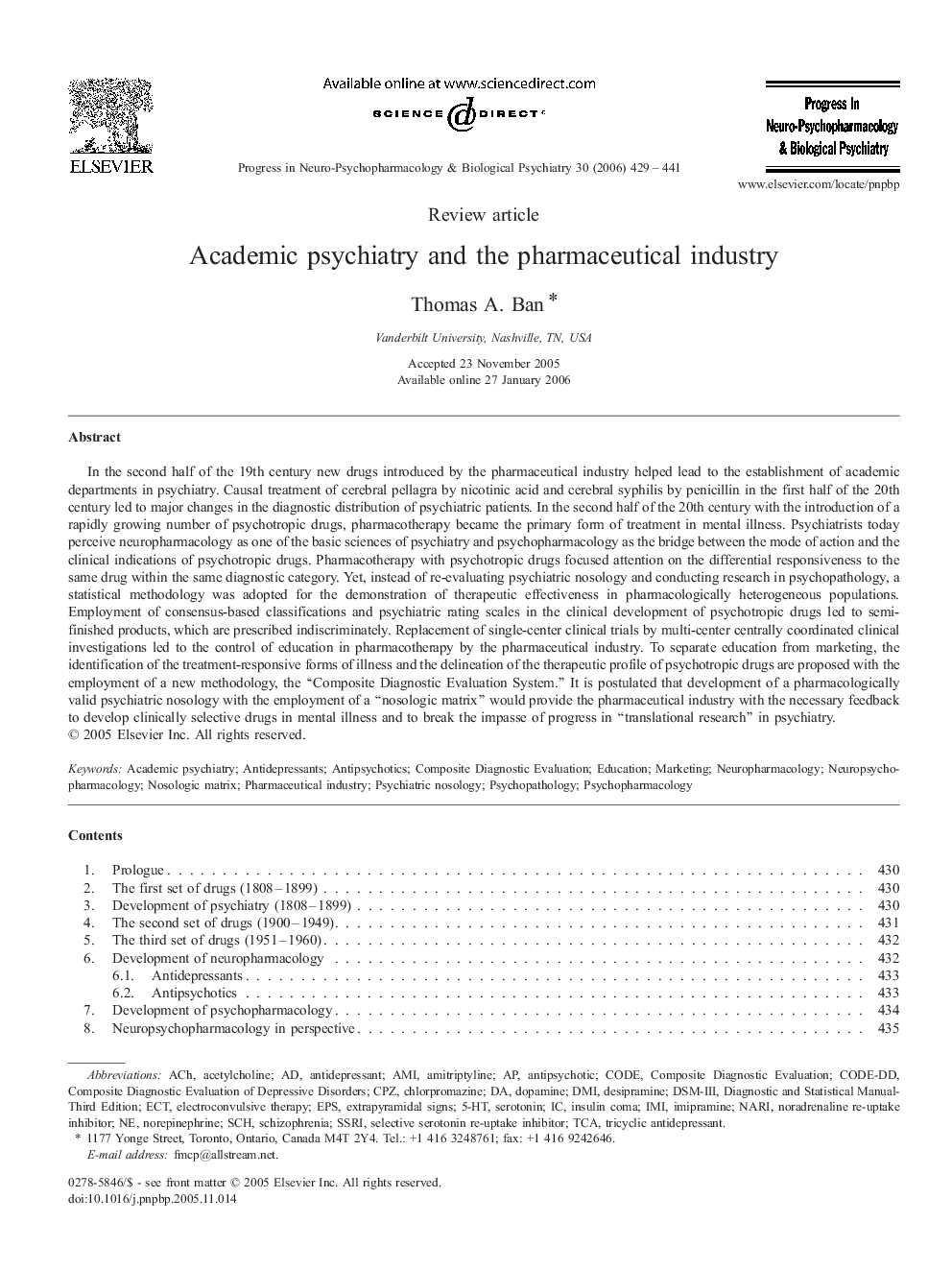| کد مقاله | کد نشریه | سال انتشار | مقاله انگلیسی | نسخه تمام متن |
|---|---|---|---|---|
| 2566832 | 1128099 | 2006 | 13 صفحه PDF | دانلود رایگان |
عنوان انگلیسی مقاله ISI
Academic psychiatry and the pharmaceutical industry
دانلود مقاله + سفارش ترجمه
دانلود مقاله ISI انگلیسی
رایگان برای ایرانیان
کلمات کلیدی
IMIDSM-IIIExtrapyramidal signsdesipramineCPZ5-HTTCAEPSDMIECTAmI - AMIAmitriptyline - آمیتریپتیلینACh - آهSCH - اس اسAcetylcholine - استیل کولینSchizophrenia - اسکیزوفرنی یا شیزوفرنیImipramine - ایمپرمینMarketing - بازار یابیselective serotonin re-uptake inhibitor - بازدارنده جذب دوباره سروتونین انتخابیEducation - تحصیلاتAntidepressants - داروهای ضد افسردگیAntipsychotics - داروهای ضد روانپریشیTricyclic antidepressant - داروهای ضدافسردگی سه حلقه ایAntipsychotic - داروهای ضدروانپریشیElectroconvulsive therapy - درمان با ضربه الکتریکی تشنجآور، الکتروشوک درمانیDopamine - دوپامینPsychopharmacology - روان داروشناسی، سایکوفارماکولوژیSerotonin - سروتونینPsychiatric nosology - شناسنامه روانپزشکیPharmaceutical industry - صنعت داروییAntidepressant - ضدافسردگیNeuropharmacology - عصب شناسیPsychopathology - علم آسیبشناسی روانیSSRI - مهارکنندههای بازجذب سروتونینNARI - نریnorepinephrine - نوراپی نفرینNeuropsychopharmacology - نوروپسی فیش شناسیcode - کدchlorpromazine - کلرپرمازین
موضوعات مرتبط
علوم زیستی و بیوفناوری
علم عصب شناسی
روانپزشکی بیولوژیکی
پیش نمایش صفحه اول مقاله

چکیده انگلیسی
In the second half of the 19th century new drugs introduced by the pharmaceutical industry helped lead to the establishment of academic departments in psychiatry. Causal treatment of cerebral pellagra by nicotinic acid and cerebral syphilis by penicillin in the first half of the 20th century led to major changes in the diagnostic distribution of psychiatric patients. In the second half of the 20th century with the introduction of a rapidly growing number of psychotropic drugs, pharmacotherapy became the primary form of treatment in mental illness. Psychiatrists today perceive neuropharmacology as one of the basic sciences of psychiatry and psychopharmacology as the bridge between the mode of action and the clinical indications of psychotropic drugs. Pharmacotherapy with psychotropic drugs focused attention on the differential responsiveness to the same drug within the same diagnostic category. Yet, instead of re-evaluating psychiatric nosology and conducting research in psychopathology, a statistical methodology was adopted for the demonstration of therapeutic effectiveness in pharmacologically heterogeneous populations. Employment of consensus-based classifications and psychiatric rating scales in the clinical development of psychotropic drugs led to semi-finished products, which are prescribed indiscriminately. Replacement of single-center clinical trials by multi-center centrally coordinated clinical investigations led to the control of education in pharmacotherapy by the pharmaceutical industry. To separate education from marketing, the identification of the treatment-responsive forms of illness and the delineation of the therapeutic profile of psychotropic drugs are proposed with the employment of a new methodology, the “Composite Diagnostic Evaluation System.” It is postulated that development of a pharmacologically valid psychiatric nosology with the employment of a “nosologic matrix” would provide the pharmaceutical industry with the necessary feedback to develop clinically selective drugs in mental illness and to break the impasse of progress in “translational research” in psychiatry.
ناشر
Database: Elsevier - ScienceDirect (ساینس دایرکت)
Journal: Progress in Neuro-Psychopharmacology and Biological Psychiatry - Volume 30, Issue 3, May 2006, Pages 429-441
Journal: Progress in Neuro-Psychopharmacology and Biological Psychiatry - Volume 30, Issue 3, May 2006, Pages 429-441
نویسندگان
Thomas A. Ban,